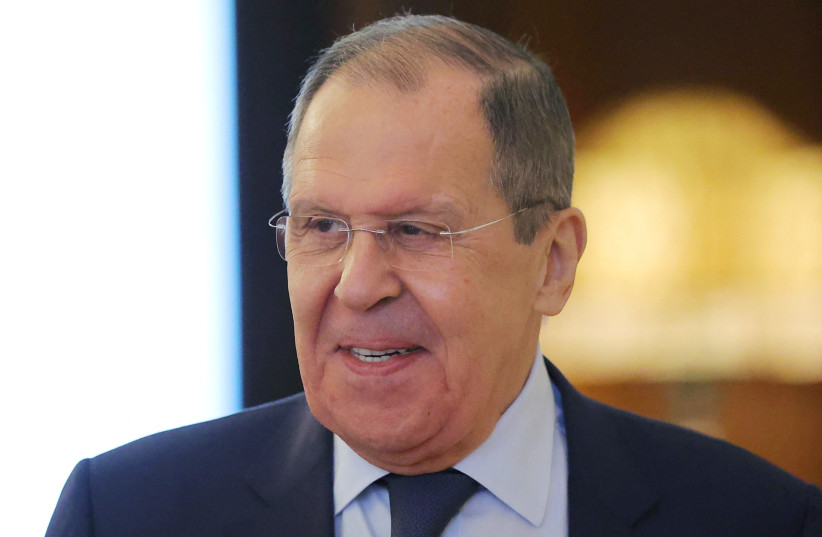Russian Foreign Minister Sergei Lavrov made an important comment this week when he said Russia would draw down its diplomatic presence in the West.
“The Russian foreign minister recalled many Russian diplomats due to the Russophobic policy of the West,” Russian state media reported, adding that he “stopped their business trips abroad ahead of schedule.”
This is significant for the Middle East and Israel, and it could have ramifications for the region.
The statement is important because Moscow now says it sees “no point in maintaining the previous diplomatic presence in Western states.” Lavrov said this while talking to college graduates admitted for diplomatic service for the first time.
Russia's future is in the East
This means he is signaling that the future of Russia is in the East. This isn’t a Lavrov initiative – Russia’s president has openly challenged the West and invaded Ukraine. This is Russian policy.

Lavrov’s articulation is important, however, because it is one more step, one more symbol, of Russia’s rapid adjustment toward the East. That means Russia will focus more on countries linked to the SCO and CICA, two international groupings that recently met in Uzbekistan and Kazakhstan, respectively.
Russia is meeting with China, India, Iran, Turkey, the Central Asian states and other countries that it wants to work with, including Azerbaijan, Armenia, Belarus, Pakistan and Malaysia.
It also meets with the countries it sees as traditional friends, including Venezuela, Syria and a few others in Latin America and Africa. Russia also has interests in Hungary, Serbia and certain states in the Middle East.
“There is neither point nor desire to maintain the previous presence in Western states,” Lavrov said. “Our people work there in conditions that can hardly be called human. Problems are being created constantly for them; they face threats of physical assaults. And, most importantly, there’s no work to do since Europe decided to shut off from us and sever any economic cooperation. You can’t force love.”
"You can’t force love"
Russian Foreign Minister Sergei Lavrov on ties with the West
Russia is shifting its center of gravity, he said. Or rather, it is hoping the world’s center of gravity will shift to Asia.
What is Russia saying here?
This isn’t a “new Cold War” but rather a huge shift in the world: from a Eurocentric world that was rooted in European power and the era of colonial rule (as well as the World Wars) to, since World War II, a world where the US was the single global hegemonic power that led an international, rules-based world order; to a new world order that is ostensibly supposed to be multipolar and led by China, Russia, Iran, Turkey and their friends – mostly authoritarian regimes.
Those who predicted the rise of Asia, particularly China, have been making this argument for ages. It’s not a secret that there is a rise in Asia and a predicted decline in the West.
Russia is openly embarking on this “geographical reorientation of activities both abroad and in the central office.” That means it has already instructed its Foreign Ministry to draw down in the West. It is hoping the decline of the US and the West accelerates faster.
Russia is now pivoting to do what it was already doing in the Soviet era – focusing on the global south. Russia used to have Patrice Lumumba University, later renamed in 1992, which was supposed to concentrate on training personnel from Asia, Africa, Eastern Europe, and Latin America. Lavrov is thus borrowing from Soviet-era policies, but he is rebranding them.
Why does this matter to the Middle East?
In the Middle East, this matters because Russia in the Soviet era was hostile toward Israel. Iran is now supplying Russia with drones and may supply it with missiles. Iran is also working more closely with China. A Russia-China-Iran grouping is emerging, and this will include more work with Turkey, a fellow authoritarian regime.
There is also Russia’s work with Central Asian states and Pakistan. Russia will also seek to get Gulf countries to hedge on relations with the West. US anger at Saudi Arabia, for instance, could be exploited by Moscow.
The real ramifications for Israel can already be heard in comments from Moscow, warning Israel about military support for Ukraine. At the same time, Iran’s provision of drones and drone technology is harming Ukraine and making a stronger case for Israeli support of Ukraine. There is no greater recognition of the Iranian threat than in Kyiv and in other states in the Baltic.
Russia, with its war in Ukraine, is openly shifting its focus to the region. Meanwhile, Europe is waking up to the Iranian drone threat. This means there is a rapid acceleration of convergence of policy issues that tie Israel to Ukraine, and Russia to Iran, for instance.
Convergence also means Russia may focus more on what happens in Syria or actively work to make Iran more dangerous in the region. Where Russia once sold itself as promising “stability” to the Middle East via backing authoritarians, accusing the US of backing “chaos” and endless wars, the situation now may be reversed: Russia may stoke chaos and endless wars, and the challenge for the region will be to bring stability.
It remains to be seen how Moscow’s shift in foreign-policy goals reaches the Middle East. But it may have very serious ramifications if the Moscow-Tehran partnership grows and Iran feels winds in its sails from Russia and China to resume missile and drone attacks in the region.
